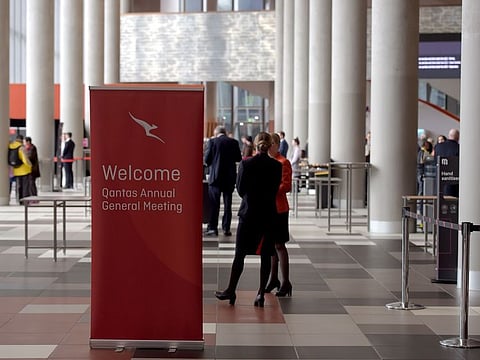Qantas investors reject pay report, voice anger at heated AGM
Shareholders overwhelmingly voted against the airline’s pay report

Sydney: Qantas Airways management endured a torrid annual meeting, with shareholders criticizing a slew of scandals from the “ghost flights” lawsuit to poor customer service that have shredded the carrier’s reputation.
Shareholders overwhelmingly voted against the airline’s pay report, Chairman Richard Goyder said as he opened the meeting in Melbourne on Friday. Some 83 per cent of proxy votes lodged before the meeting voted against the remuneration report in a protest against the company’s performance.
“It’s clear there has been a substantial loss of trust in the national carrier,” Goyder said in his opening address. “We hear the message this strong vote sends, particularly in response to broader frustration with past events, and it galvanizes our efforts to restore your confidence.”
While the vote against the pay report is non-binding and largely symbolic, it is one of the few ways shareholders have to show their disapproval of the company’s performance. Under what is known as the “two-strikes rule,” if shareholders vote down the report again at next year’s meeting, a vote is then called as to whether all board members need to stand for re-election.
Shareholders also lodged a protest against the re-election of marketing executive and TV celebrity Todd Sampson to the board, with 34 per cent of proxy votes lodged before the meeting voting against him.
During the two-and-a-half-hour meeting, shareholders questioned Goyder about the airline’s retention of Covid flight credits, the loss of expired frequent flyer points, the suspension of dividend payments and steps that are being taken to improve customer service. At one stage, the chairman shut down a question about former CEO Alan Joyce’s sale of shares earlier this year, invoking cries of “shame on you” from some members of the audience.
He later refused to answer a question on why the airline had reportedly given Prime Minister Anthony Albanese’s son a membership of its exclusive Chairman’s Lounge, saying he wouldn’t go into any matters around membership of the invitation-only club usually reserved for senior politicians and business executives.
Goyder, who has chaired the airline for five years, has already flagged he will leave before next year’s AGM as part of a boardroom overhaul to repair its public standing. Fellow directors Jacqueline Hey and Maxine Brenner will retire at the half-year results in February after decade-long tenures, and Michael L’Estrange’s term finishes today.
Goyder’s performance at the meeting showed “genuine” board renewal is needed to restore trust in the airline, the Transport Workers Union, which has long been at loggerheads with Qantas, said in a statement Friday.
“Goyder’s defensive, lackluster and at times incoherent performance at the AGM didn’t reflect the behaviour expected of someone so experienced,” the union said. “The chair refused to answer questions and shielded directors from questions directed to them.”
New CEO Vanessa Hudson reiterated the airline has listened to shareholders, customers and workers about their complaints.
“Reflecting on what I’ve heard, the disappointment and frustration is clear,” Hudson said in her opening address. “For that, we have sincerely apologised to our customers and people, and I apologize to you, our shareholders, today.”
Qantas earlier this week rebutted the allegations, saying they “ignore the realities of the aviation industry” and canceled flights don’t equate to the airline obtaining a “fee for no service” because customers were re-booked on other flights or refunded.
The suit prompted an early end to Joyce’s 15-year tenure as CEO - he was originally due to step down after Friday’s meeting. He had previously attracted vociferous public anger for the airline’s lack of reliability as travel boomed after pandemic-era restrictions were lifted.
The carrier has also been criticized for retaining more than A$500 million of Covid flight credits, and posting a record profit on the back of hefty fare increases in the midst of a cost-of-living crisis.
In September, Australia’s highest court ruled Qantas illegally fired almost 1,700 ground workers during the pandemic, while the company has also come under pressure for its role in the government’s decision to block more Qatar Airways flights into Australia.
Sign up for the Daily Briefing
Get the latest news and updates straight to your inbox






